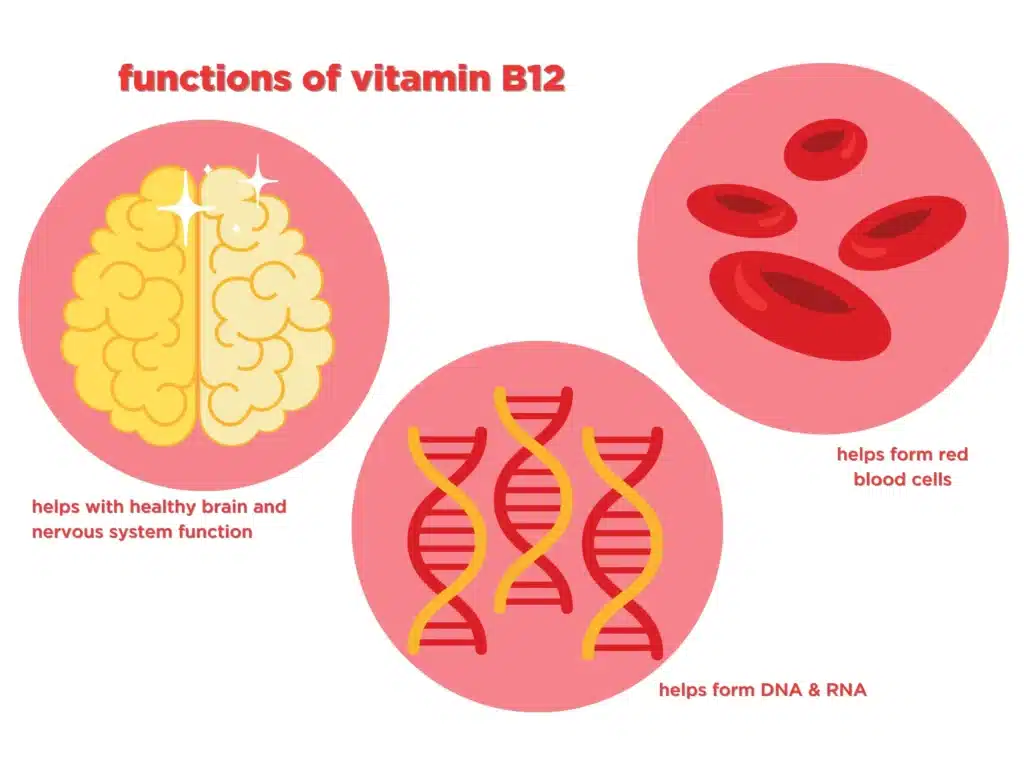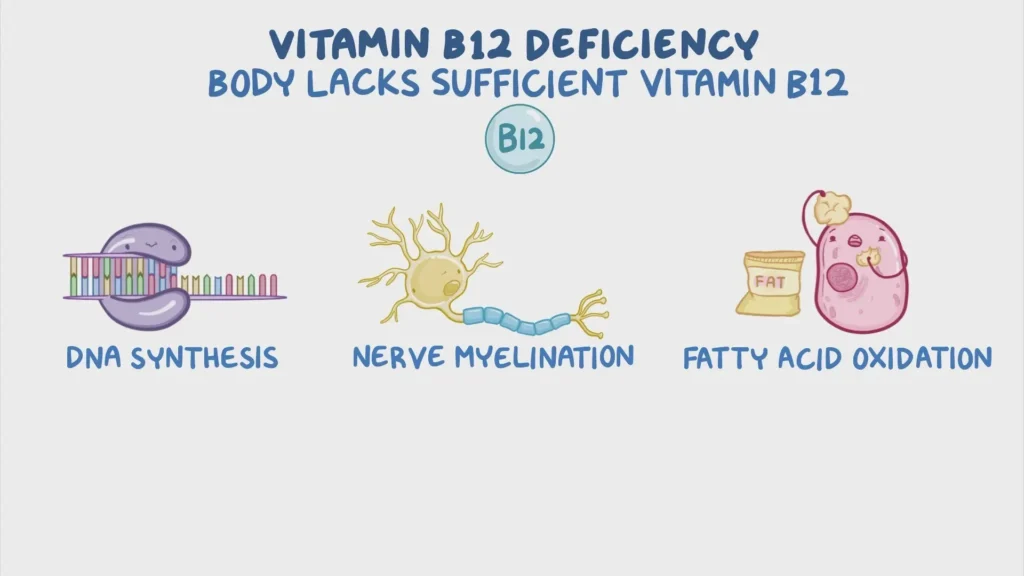Vitamin B12 may not always get the spotlight like vitamin C or D, but it plays an essential role in keeping our bodies running smoothly. From neurological function to red blood cell production, a deficiency, known as Vitamin B12 Deficiency, in this crucial vitamin can lead to long-term health problems if not addressed quickly. This article dives into the signs, causes, and actionable solutions for B12 deficiency—tailored for a modern UAE lifestyle.

What Is Vitamin B12 and Why It Matters
Vitamin B12 (cobalamin) is a water-soluble vitamin vital for three primary functions:
- Red blood cell formation
- DNA synthesis
- Neurological function
It is naturally found in animal-based foods, which means those following plant-based diets are more susceptible to deficiency. B12 deficiency can cause a condition known as megaloblastic anaemia, where the body produces unusually large and dysfunctional red blood cells. But more critically, long-term deficiencies can impact cognitive performance, mood stability, and nerve health.

Who Is at Risk of B12 Deficiency in the UAE?
Several demographics are particularly vulnerable:
- Vegetarians and Vegans: Without animal products, dietary B12 becomes nearly impossible to obtain naturally.
- Older Individuals: Ageing reduces the stomach’s ability to absorb B12.
- People with Digestive Disorders: Conditions like Crohn’s disease or celiac disease can impede absorption.
- Long-term Medication Users: Proton pump inhibitors and metformin have been linked to lower B12 absorption.
- Heavy Alcohol Consumers: Alcohol impairs nutrient absorption and damages gut health.
According to Sophie Trotman, a registered nutritionist, “Long-term use of certain medications, such as proton pump inhibitors or metformin, and excessive alcohol intake can also lead to B12 deficiency.”

Recognising the Symptoms: Are You B12 Deficient?
A Vitamin B12 deficiency doesn’t usually develop overnight. It can creep in over time, with symptoms often mistaken for other health issues. Common signs include:
- Chronic fatigue or weakness
- Numbness or tingling in hands and feet
- Difficulty walking or maintaining balance
- Memory loss or cognitive decline
- Pale or jaundiced skin
- Mood changes such as depression or irritability
Dr Lapa, a UAE-based nutritional health consultant, adds: “In extreme cases, B12 deficiency can lead to severe and potentially irreversible symptoms including nerve damage and significant cognitive decline.”

The Science: How Does B12 Deficiency Happen?
Vitamin B12 from food is bound to protein and must be released through stomach acid. It’s then absorbed in the small intestine with the help of intrinsic factor, a glycoprotein. If any part of this chain breaks, such as low stomach acid or damaged intestinal lining, deficiency may follow.
This makes it especially important in the UAE, where high-stress lifestyles and gastric issues are common. Overuse of acid-reducing medications, prevalent among expats and locals alike, also plays a contributing role.

Can You Get Enough B12 From Diet Alone?
Yes—and no. If you consume a diet rich in animal products, you’re likely safe. Foods high in B12 include:
- Organ meats (especially liver)
- Shellfish such as clams and crabs
- Fatty fish like salmon and tuna
- Eggs
- Dairy: milk, yoghurt, and cheese
For vegetarians and vegans, fortified foods become essential:
- Plant-based milks enriched with B12
- Fortified cereals
- Nutritional yeast
However, Trotman notes, “It’s challenging to obtain sufficient B12 from plant-based sources alone,” suggesting supplementation for those following a strict vegan or vegetarian diet.

Supplementation: When Food Isn’t Enough
If you’re showing symptoms or fall into an at-risk group, supplementation may be necessary. Options include:
- Oral Supplements: Cyanocobalamin and methylcobalamin are common forms. Methylcobalamin is more bioavailable but pricier.
- Sublingual Tablets: Absorbed under the tongue, bypassing the digestive tract.
- Nasal Sprays: Quick and convenient, especially for those with absorption issues.
- Injections: Administered intramuscularly, these are used in severe cases for rapid correction.
Wedgwood, a clinical nutritionist, explains: “B12 shots bypass the digestive process entirely, allowing for more immediate absorption. Many patients feel a boost in energy and mental clarity within a week or two.”

How to Get Tested in the UAE
Blood tests for B12 levels are widely available in the UAE through private clinics and hospitals. If you experience symptoms or fall into a high-risk category, request a blood test that measures:
- Serum B12
- Methylmalonic acid (MMA)
- Homocysteine levels
These biomarkers offer a fuller picture of your B12 status. Testing is quick and affordable, and often covered by health insurance.

The Risks of Ignoring a Deficiency
Left unchecked, a deficiency in Vitamin B12 can lead to:
- Irreversible nerve damage
- Severe anaemia
- Cognitive impairment
- Mood disorders, including depression and paranoia
- Heart issues due to elevated homocysteine levels
As Dr Lapa puts it, “If left untreated, these symptoms can result in permanent nerve damage and substantial impairment in daily functioning.”

Prevention: A UAE Lifestyle Guide
To maintain healthy B12 levels, consider the following steps:
- Eat B12-rich meals regularly
- Monitor alcohol consumption
- Avoid unnecessary use of antacids
- Consider annual blood tests, especially if you’re vegan or over 50
- Use supplements if advised by your doctor
In a fast-paced country like the UAE, where brunches, travel, and high-pressure jobs are common, burnout symptoms might be masking something more serious, like a B12 deficiency.

Final Thought
Vitamin B12 may be the unsung hero in your nutritional line-up, but it’s one you can’t afford to ignore. Whether you’re a wellness aficionado or just trying to stay energised through the working week, keeping your B12 in check is a smart move. With simple dietary adjustments, routine tests, or strategic supplementation, staying on top of this essential nutrient is easier than ever.



